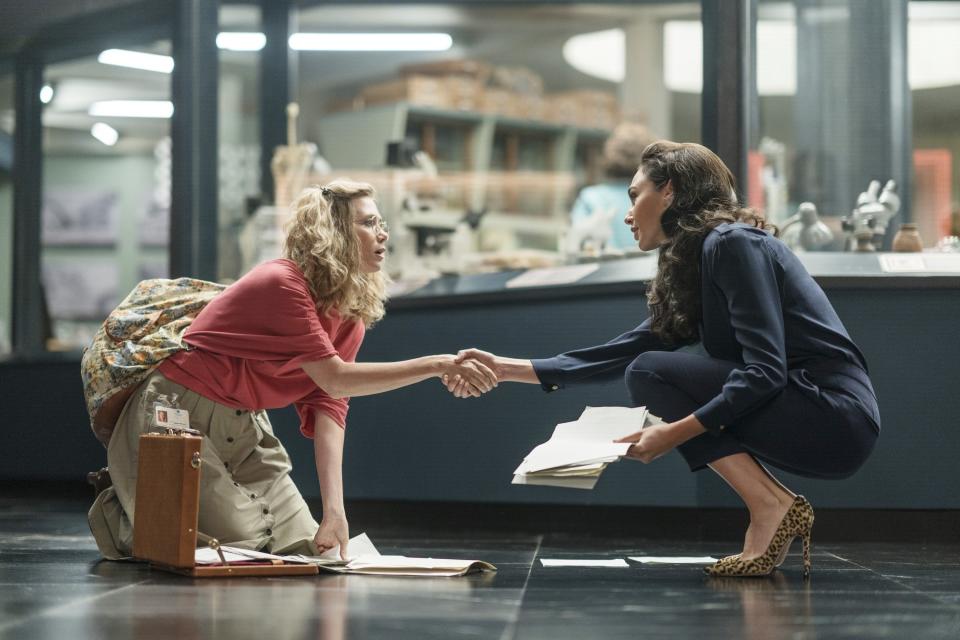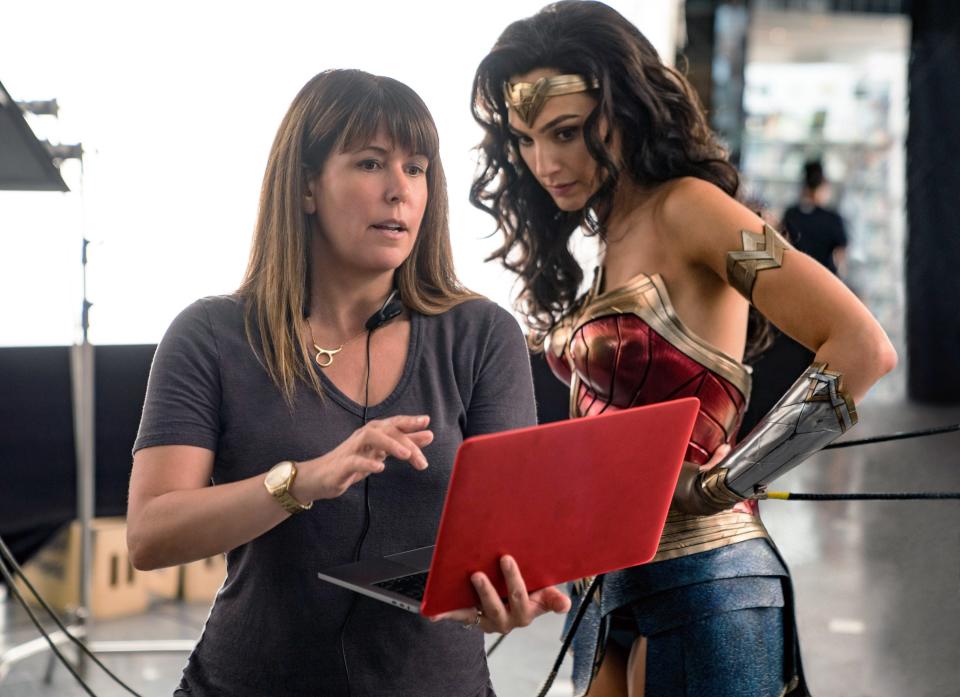Wonder Woman: 1984 Is Very Different Than the First Film—and That's a Good Thing
As the women of Themyscira compete in Amazon Ninja Warrior in the opening moments of Wonder Woman: 1984, I realized how much I'd missed big-budget blockbusters. It'd been over 300 long days since Birds of Prey opened in theaters pre-pandemic, and I experienced the unique catharsis of watching women save the day.
Thankfully, when Patty Jenkins was asked to approve the film's release to HBO Max on the same day as its theatrical release due to the ongoing coronavirus pandemic, she felt the same way. “When we were trying to decide whether to release it or not, I realized I missed my own movie,” she tells me over the phone. “That's when I was like, ‘Now is the time.’ I would see the footage and I couldn't get enough of my own movie. I thought, I just want to stay here."
Here, it turns out, was the vibrant, optimistic, and blatantly excessive world of the 1980s, a far cry from the somewhat muted, severe WWI-era that Diana Prince (Gal Gadot) dropped into during the first Wonder Woman film. Fast-forward 66 years and Diana is fighting crime and wearing amazing suits—both of the business and super variety. Still, she can't help pining over her first love, Steve Trevor (Chris Pine), even though her adorable and intelligent Smithsonian Museum coworker Barbara Minerva (Kristen Wiig) is right there!

MCDWOWO WB071
©Warner Bros/Courtesy Everett CollectionLong story short, while examining a mysterious artifact for the F.B.I., Diana and Barbara unwittingly wish upon a “Dream Stone” which grants the return of Steve for Wonder Woman and the ability to fend off drunken catcallers and look hot doing it for Barbara—she wanted to be more like Diana, okay? Of course, there's a catch, and Diana must destroy the stone or renounce her one true wish before she loses her powers. Unfortunately, Barbara—now known as Cheetah—is less than willing to give up her newfound strength even as it drains her of her humanity.
What follows is two hours and 35 minutes of whimsical escapism with a pinch of heartbreak and a dash of hopeful idealism. I spoke to Patty Jenkins about the film's message, fighting for her paycheck, and the possibility of Wonder Woman III. Warning: spoilers ahead.
I wanted to start by asking: If you didn't know the consequences of the dream stone, what would you wish for right now, and what would it cost you?
That's a hard one. I do think I would wish for the end of climate change and for people to be better than they are—for mankind to have been much better. I think it would cost me my family. That's my thing that is the most valuable to me. I don't know if it's my greatest strength. My ability to make movies would be a terrible thing to lose.
In a recent interview, you said that Trump was not the inspiration behind the film's poignant wall moment. But I found there to be so much Trump in Pedro Pascal's character, Maxwell Lord, from his hair to the line, "I'm not a conman, I'm a television personality." How much of that was intentional?
You know what's funny is that none of it was intended to be about him. It may seem like I'm lying or like I'm trying to hide it, but it's actually true. It was about someone who wants to be a Trump. In the [comic book] lore, Max Lord is somebody who is a powerful businessman, right? The way we were subverting it a little bit is that actually, in this case, you end up with somebody who's trying to emulate a powerful businessman.
So there's definitely Trump, Madoff, and Gordon Gekko—all of those guys are definitely there—but how he got there was just by trying to be exactly those kinds of guys. If Lord was Trump, the story would have ended a lot differently. I couldn't have told the story about Trump.

MCDWOWO WB062
©Warner Bros/Courtesy Everett CollectionThat kind of feeds perfectly into my next question. We don't really get to see any consequences for his or Cheetah's actions, aside from the mess they've made of their own lives. Was there a purpose behind that?
So there's a bunch of things I'm trying to do here: No one dies in the movie. There are no bad guys. The victory happens with a conversation. There are no consequences because, what did they do? What did they do that there could be consequences for...magic? Also, what would the satisfaction be? The victory of the movie is the change of heart that they have and not the punishment.
Why?
I'll tell you why. For thousands of years, we've used these common characters to tell stories that matter to our time or to process our lives. The superhero model really came from the post-World War II and all of us feeling powerless to evil in the world until we made these superheroes that could go and stop Adolf Hitler and stop those kinds of people and crush the bad guy. But hasn't that metaphor changed? Don't we know that there is no single bad guy we can go crush now? What is the supervillain, now? Who's the bad guy? It's all of us, we're destroying our world. We're letting ourselves support every villain in every passive way by buying their stuff.
Personally, the hero inside of me isn't inspired anymore by seeing somebody powerful crush somebody evil. I do feel very inspired by watching someone become a hero by taking on the hardest thing in the world, which is sacrifice, or choosing others over yourself. To me, it was ripe for the picking to say, “What else does a superhero stand for than smashing an individual?” And who better than Wonder Woman, who's here to stand for loving mankind and teaching mankind love?
You once said you didn't feel finished with Wonder Woman after the first film, but with Cleopatra and Rogue Squadron coming up, do you feel like you're done with Wonder Woman? Do you feel like you're ready to move on?
No, I still love Wonder Woman. I would still love to do the third Wonder Woman. Gal and I talk about it, and I have a loose idea. So, depending on what's going on at Warner Brothers…Warner Brothers is in a really weird place right now, so that will play into what happens. I would still love to do Wonder Woman.

MCDWOWO WB011
©Warner Bros/Courtesy Everett CollectionI don't want to ask how you feel about being the first woman running a Star Wars movie because I feel like we've been there done that with Wonder Woman. But factions of the Star Wars fandom have harassed Daisy Ridley and Kelly Marie Tran mercilessly. Are you at all concerned or prepping for that similar reaction by some of the fans?
Totally. When it's such a huge fan base, there's going to be somebody out there that says everything. You have to be braced for that. It's not your thing. Wonder Woman doesn't belong to me, and you're going to have every kind of person in the world who thinks that Wonder Woman belongs to them.
I know that about the Star Wars thing, but nevertheless, I think that if your love is true for what you're doing and your intentions are to try to do the best you can, that's sort of all you can do. Doing these tentpoles, you have to have thick skin in lots of different ways. You have to carry an enormous amount of stress the entire time. Luckily it's nothing new to me. It's on a bigger scale, but I've gotten used to the low-grade version of it.
Speaking of Warner Brothers, your fight for parity with male filmmakers for Wonder Woman: 1984 was pretty inspirational. Do you have any advice for women who are looking to advocate for themselves?
The thing that made it easier was that I saw that it was factually so disproportionate. I saw a bunch of first time superhero directors with much smaller characters, they all got paid way more than I did the first time. And then the jumps that they made to the second one were enormous—and they all still got paid more than I did. Still, to this day, but they had made unsuccessful films!
It's unfortunate because it makes you have to talk about your own value, but it was just a no can do for me. I would rather make a movie for half as much money at another studio in town than know for a fact that I am defying the model that has been laid by men and still getting less. It was an unfortunately unpleasant struggle. It wasn't even about believing in myself, it was believing in data. If the data is true and there's no way to explain why you're getting so much less all the time, then it has to be changed. Or, on principle, you have to not do that job.
Wonder Woman is available to stream on HBO Max.
Emily Tannenbaum is an entertainment journalist, critic, and screenwriter living in L.A. Follow her on Twitter.
Originally Appeared on Glamour

